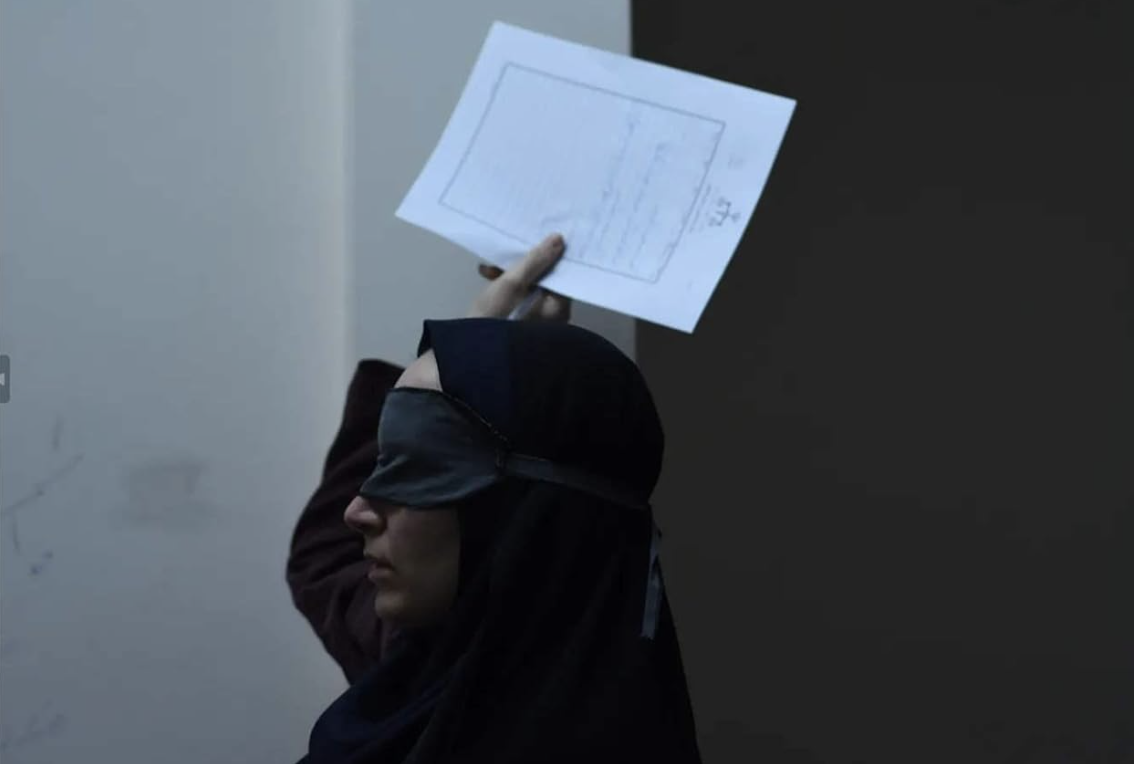A man drops bullets on a table, one by one. In the opening scene of “The Seed of the Sacred Fig,” Iman (Missagh Zareh) receives a gun as part of a promotion to investigative judge in Tehran. Rasoulof immediately sets the stage for his tense thriller in a Hitchcock-esque fashion, showing the audience the proverbial bomb under the table as we wait for it to explode.
Iman’s promotion coincides with the 2022 “Woman, Life, Freedom” protests, when Iranians took to the streets to protest the death of Mahsa Jina Amini after she was arrested by Iran’s Morality Police for improperly wearing her hijab. Iman, once a fair man, is corrupted by the system and sentences protestors without due process and confines his daughters, Rezvan (Mahsa Rostami) and Sana (Setareh Maleki), and his wife Najmeh (Soheila Golestani) to their small apartment to prevent them from becoming targets or participants. When his gun goes missing, Iman’s paranoia boils over, and he accuses his family of betrayal.
While the question of the gun hangs over the film, we see each woman’s defiance. Sana sits on her phone, enthralled by protest footage — Rasoulof includes many real videos taken by protestors during that period including those of protestors brutalized by police. Rezvan challenges the state news program in front of her parents, calling it a lie. Even a hesitant Najmeh is pulled in when Sana’s friend, Sadaf (Niousha Akhshi), is shot in the face at a protest of the compulsory hijab. It is an edge-of-your-seat thriller with a profound social message, demonstrating the resilience of people in the face of government suppression. To highlight the real-life stakes, Rasoulof intentionally chose older female actors to play the daughters given the potential consequences of being featured in what Iran considers a subversive film.
This was just one of the precautions that the director took when working on this film. Rasoulof utilized a limited cast and crew and directed via FaceTime, worried about traveling to set due to surveillance. Rasoulof was imprisoned multiple times for making past films and was close to another sentence during filming.
“Unfortunately, four weeks after the start of the shoot, I was informed that I had been initially sentenced to an eight-year prison term,” director Mohammad Rasoulof explained at an advanced screening and Q&A organized by the NYU Program Board and Persian Cultural Society. “So from that point onward, the most difficult task I had was to maintain my concentration as a director. I’m telling you this because I think you should really appreciate the importance of being able to make a film without a prison sentence hanging over your head.”
Still, despite the stifling conditions — or because of them — Rasoulof described how he felt particularly free creating the film.
“It was almost as if this desire for freedom had seeped on to the artistic dimension into a desire for formal freedom,” Rasoulof said. “And I kept telling myself at the end of every day, ‘Okay, great. You had a great time today. Let’s see tomorrow, it might all be over.’ And so I tried to allow whatever came out of me to proceed uncensored and to really let my heart speak.”
Despite being in good spirits at the Q&A, Rasoulof has faced immense consequences for the film. After filming wrapped, the appeal for his prison sentence was denied and he and some of his crew members fled the country. The saga Rasoulof went through could be its own film, and an interesting one, but despite the huge limitations on the production, “The Seed of the Sacred Fig” is a stunning film. The nearly three-hour runtime flies by as tensions increase in the apartment and the women are subject to increasingly draconian interrogation about the gun.
“I think you can be a filmmaker in prison,” Rasoulof said. “You can still be a filmmaker, but then you’re turned into a filmmaker who’s sacrificed by censorship — a victim filmmaker. And I thought, I’ve got so many ideas in my head that I really want to realize instead, and that’s what I should do.”
Contact Sawyer Gouw Ranzetta at [email protected].























































































































































